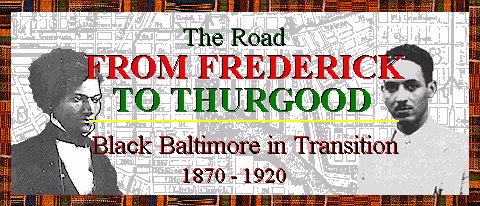 |
Rev. William Moncure Alexander:Personal Life |
 |
Rev. William Moncure Alexander:Personal Life |
William and "Ellen" (as Mary was known to her husband) Alexander first appeared in Baltimore in 1874. The Alexander-McGuinn clan resided at 154 Preston Street. William attempted to make a living at several vocations during his early stay in Baltimore (1874 - 1879). Having been Baptists in Richmond (belonging to that city's Second Baptist Church), once in Baltimore, the Alexander-McGuinn clan eventually placed themselves under the spiritual care of Rev. Harvey Johnson at North Street Baptist Church (later, Union Baptist Church). Rev. Johnson appears to have had a profound effect on William, for in 1879, Alexander enrolled at Wayland Seminary, Washington, D.C. However, while studying for the ministry, Alexander maintained his home in Baltimore, on Preston Street. He was ordained by Harvey Johnson at Union Baptist, and began missionary work, and in 1882 William Alexander graduated as valedictorian of Wayland Seminary.
After a brief period in which his missionary activity was focused outside of Baltimore City, by the mid-1880s, William Alexander began to cultivate the Baptist faith among the growing black populace of northwest Baltimore. The ultimate result was is the founding of the Patterson Avenue/Sharon Baptist Church in 1885. Hand-in-hand with his spiritual mission was a political, social mission. He was a "race man" in every sense of the word. Ideas of race progress and uplift motivated his work no less than salvation. On June 22, 1885, William Alexander joined three Baptist colleagues, the reverends J.C. Allen, P.H.A. Braxton, and W.C. Lawson, as they attended a meeting at the home of Rev. Dr. Harvey Johnson, 775 W. Lexington St. The result of this meeting was a civil rights organization, the Mutual United Brotherhood of Liberty of the United States of America (MUBL). Attendees at the meeting pledged themselves, "to use all legal means within our power to procure and maintain our rights as citizens of this our common country."
In William Alexander's home life, he seems to have been constantly surrounded by family. From the beginning of his residence at 154 Preston Street (1874), step-brothers Robert A. McGuinn, Warner T. McGuinn, and mother Fannie Alexander McGuinn (until her death in 1889) lived with William and Ellen. For the males, William, Robert, and Warner, service jobs and manual labor seem to have financed opportunities for mobility and economic improvement. Warner, after working as a clerk and waiter while educating himself, went on to become a prominent Baltimore lawyer, and eventually a city councilman. Robert McGuinn performed similar jobs as his brothers during the early years in Baltimore before becoming a minister himself (a son, Robert P. McGuinn went on to a career in law like his uncle). The home at 154 Preston served as a starting point for newly arrived Virginians -- probably cousins, or other relatives. For example, while no mention is made of the McGuinn clan, a thirty-five year old black man, "Robert Bradley," is enumerated at the Alexander's address, as is Bradley's 30 year-old wife, "Martha," their 12 year-old daughter, "Mary," an 18 year-old mulatto, "Henrietta Eucles" (who would later assist William and Ellen Alexander in establishing a school in Sharon Baptist Church), and "Marta Alexander", a 29 year-old. All the people enumerated at 154 Preston in 1880 were Virginia-born.
The close-knit nature of the Alexander-McGuinn clan appears to have been passed to the second-generation. While William and Ellen Alexander apparently had no children of their own, the reared a niece and nephew. Furthermore, the entire extended family -- Alexanders and McGuinns -- shared a second home with a move to 434 Orchard Street (37 Orchard prior to 1887 address renumbering) in 1882, and a third home, 525 McMechen, after 1889.
By the turn-of-the-century, death had claimed both Frances "Fannie" Alexander McGuinn (July 1889) and Mary Ellen Smith Alexander (November 1899). However, in the home at 525 McMechen widower Alexander resided with his step-brother, Robert A. McGuinn, step-sister-in-law, Nannie McGuinn, and their children. The final decade of William Alexander's life saw him once again sharing a household with family: the niece he and Ellen had raised, Mrs. Fannie Caradoza, her husband Dr. Francis N., and John Johnson (William's brother in-law) shared a home at 1625 Druid Hill Avenue.
William Alexander remained active in his church and community. He fostered such growth that the Sharon Baptist moved several times to during his tenure to larger, more centralized locations. In addition, his political involvement saw him at the center of black resistance movements to the various segregation ordinances, disenfranchisement efforts, and other assaults on civil rights waged during the first two decades of the 1900s. He was instrumental in the movement which placed his step-brother Warner McGuinn on the city council.
During his lifetime, Rev. Alexander was a savvy, if only small-scale business man. He was co-founder in several business ventures: the Queen Commercial Enterprise, the People's Fraternal and Beneficial Society, the Southern Life Insurance Company, and the Northwestern Supply Company. Out of a need to advertise the Northwestern Supply Company, Alexander began publishing a weekly newspaper in 1892, the Afro-American. A few years later, he sold the newspaper to John H. Murphy, whose descendants still publish the paper today, more than a century later. After a short illness, Rev. William M. Alexander died on April 10, 1919. As a tribute to his lifetime of service, a public school was named in his honor.
|
Tell Us What You Think About the Maryland State Archives Website!
|
© Copyright October 20, 1998 Maryland State Archives